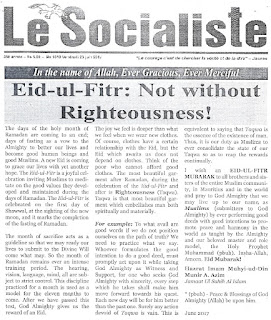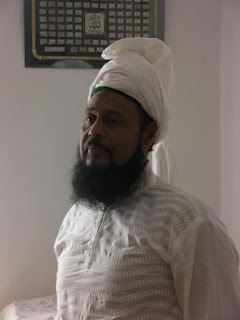The spiritual training of Ramadan
Alhamdulillah - by the grace of Allah - we have spent the month of Ramadan in a very good way, and all that which we have been able to do during that month must be continued for the rest of the eleven months to come, Insha-Allah. If we have succeeded in putting into practice that which we did during the month of Ramadan, then we need to say Alhamdulillah Summa Alhamdulillah that the Ramadan has brought for us loads of spiritual blessings and benefits. These benefits touched our physical bodies as well as our souls, and they helped us in putting into practice the divine commandments, with hard striving and much effort. We also asked of Allah to help us to put these instructions of His into practice despite the weaknesses which are found in us.
Alhamdulillah - by the grace of Allah - we have spent the month of Ramadan in a very good way, and all that which we have been able to do during that month must be continued for the rest of the eleven months to come, Insha-Allah. If we have succeeded in putting into practice that which we did during the month of Ramadan, then we need to say Alhamdulillah Summa Alhamdulillah that the Ramadan has brought for us loads of spiritual blessings and benefits. These benefits touched our physical bodies as well as our souls, and they helped us in putting into practice the divine commandments, with hard striving and much effort. We also asked of Allah to help us to put these instructions of His into practice despite the weaknesses which are found in us.
Now, if you have been
able to do so much effort during (such) a month, it is with the help of Allah
that you have been able to do so. You have done all these to reap the pleasure
of Allah and His forgiveness, and you even strived to get Allah (swt) Himself
as your reward. Ramadan has left us (be it in Mauritius and the rest of the
world) and went after 29 or 30 days of spiritual training; such training which
would enable us to preserve and do all the more good deeds for the rest of the
eleven months to come (before the next Ramadan).
Beyond Ramadan: Sustain the Jihad against Satan
 If after the passage of
Ramadan, we (i.e. all Muslims) return back to the rusted vices we used to
indulge in, this means that we have not benefited anything from the month of
Ramadan. Therefore, you people (i.e. those who have let go of the spiritual
blessings after Ramadan) have lost the valuable rewards you once obtained from
Allah (swt) during Ramadan. A sincere believer who loves Allah a lot must know
that for each good deed he does, there is a reward which the divine law has
promised him/ her. And that reward is not a simple reward. The value of that
reward is measured according to the one who gives that reward. The gift of a
common person and that of a king is different, and we need not mention it here
(for we all know about it).
If after the passage of
Ramadan, we (i.e. all Muslims) return back to the rusted vices we used to
indulge in, this means that we have not benefited anything from the month of
Ramadan. Therefore, you people (i.e. those who have let go of the spiritual
blessings after Ramadan) have lost the valuable rewards you once obtained from
Allah (swt) during Ramadan. A sincere believer who loves Allah a lot must know
that for each good deed he does, there is a reward which the divine law has
promised him/ her. And that reward is not a simple reward. The value of that
reward is measured according to the one who gives that reward. The gift of a
common person and that of a king is different, and we need not mention it here
(for we all know about it).













